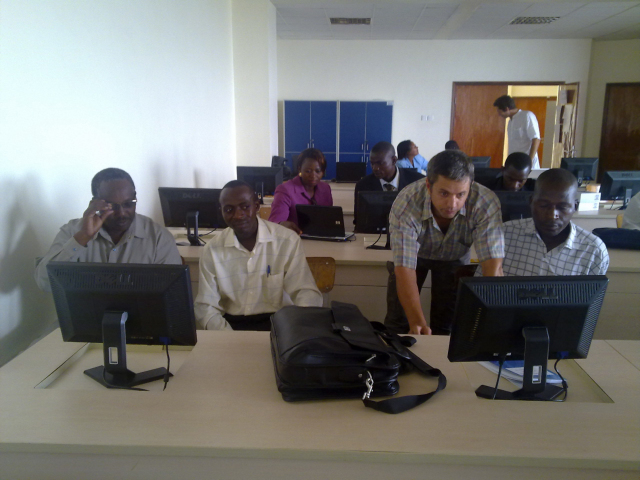2009 Rwanda
CERN-UNESCO School on Digital Libraries held in Kigali Institute of Science and Technology (KIST)
Kigali, Rwanda 21 - 25 September 2009
CERN and UNESCO reach out to Rwanda
CERN already has a successful relationship with some African countries. However, much remains to be done to improve the dialogue with that continent. A recent trip to Rwanda provided a new opportunity to share knowledge and technology and create a connection that may last for many years.

CERN’s Jean-Yves Le Meur, second from the right, teaches participants how to install the digital library system on their computers.
In addition to physics research, CERN’s key missions also include training and international collaboration. Recently, thanks to funding from UNESCO, CERN’s Scientific Information Service was able to provide face-to-face training of digital library software developed at CERN, and the CERN Education Group organised a two-day high-school teacher training programme.
"Many African countries are in the process of digitising their libraries," explains John Ellis, CERN’s Coordinator for non-Member States. "A workshop was organised in September by CERN in Rwanda to help familiarise librarians there with the library software we have at CERN, with the idea of deploying it and cloning it in these countries."
Jens Vigen, head of the CERN Scientific Information Service, was one of the organisers of the digital library software workshop and explained how amazing and rewarding the experience was for him. "African librarians are fully aware of the strengths of digital libraries and the importance of Open Access publishing, but training and information exchange is needed. The particle physics community is driving many of the developments in this field, so colleagues in university libraries are very keen to take advantage of our experience. The digital library software we use has been developed by CERN. It is open source, which corresponds with CERN’s goals of knowledge and technology transfer," he said. Rwanda was chosen for its strong IT profile.
Around 30 librarians and IT specialists participated in the five-day programme, which was divided into two main topics – the principles of Open Access, discussed by Vigen; and the more technical part, taught by Jean-Yves Le Meur, from CERN’s IT Department. During the exercise, everyone learned how to install and parameterise the system and then submitted a few documents as examples. "The universities and institutes there are now part of the Academic Repository of Rwanda, a service similar to the CERN Document Server, run from the Kigali Institute of Science and Technology. Our African colleagues have large collections of theses across all subjects, currently held in digital form on CDs, to add to their new repository, which will make the research visible worldwide. They are also interested in including material from CERN, such as the Academic Training Lectures and the Yellow Reports," explained Vigen. The goal is to create a self-sustainable programme that can be handled at the local level. Published in : CERN Bulletin Issue No. 45-46/2009. The full article is accessible here.